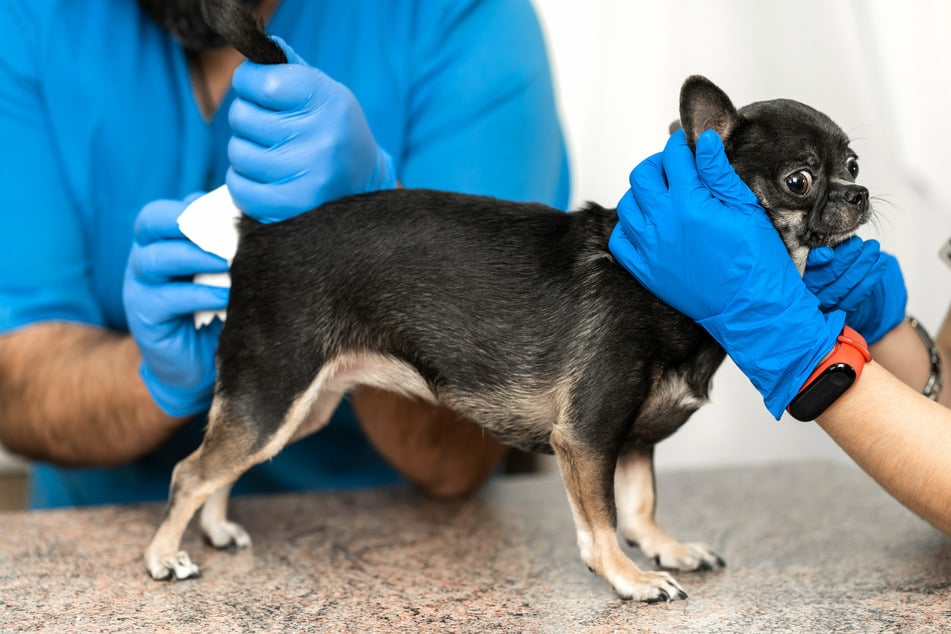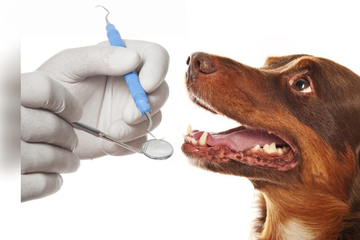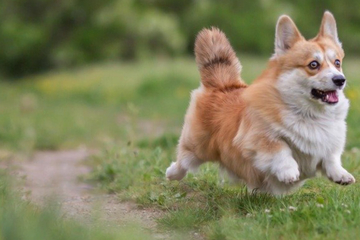Why is my dog staggering, stumbling, and sliding across the floor?
We've all seen them: those "dog sledding" videos on the internet, featuring a pooch dragging itself across the floor. But once you realize what's actually going on, they may not seem so funny anymore. So why do dogs stagger and stumble around, and what's making them drag their butts across the floor?

If your dog is stumbling or staggering around, it could easily indicate a pretty serious illness or infection. This can result in a dog "sledding", a term which refers to when a dog pulls its butts across the floor, usually because it's itchy.
While it may look hilarious, this is actually no laughing matter and should be taken very seriously. A disorientated dog is probably in a lot of stress and could be inflicted with a dangerous illness.
But don't worry, TAG24'S dog guide has you covered.
We'll take you through what it could mean if your dog is suddenly stumbling around and unsteady on its feet, why "sledding" happens, and how you can help.
Don't have much time? Here's a quick TL;DR:
- If your dog is stumbling and staggering around, it could be very unwell or just simply feeling uncomfortable for some harmless reason.
- If your dog staggers for more than 24 hours, taken it to see a veterinarian.
- A dog sliding around on butt could indicate a worm infestation, clogged anal glands, or something much more serious.
- Dog "sledding" is often combined with seemingly disoriented behavior like stumbling.
- If you're ever even slightly concerned about health of your canine companion, don't hesitate to seek the advice of a medical professional.
Why is my dog stumbling and staggering around?
There are a variety of medical issues that could be causing your dog to stumble and stagger around. Often, this behavior will be combined with other symptoms like falling over, sledding, and a sense of total disorientation.
Here are a variety of serious medical reasons why your dog might be stumbling and staggering around:
- Ear infection: An infection in the ear can cause a problem with your dog's sense of balance.
- Injury: If your poor pooch has been injured, it can have mobility issues.
- Ataxia: This is a condition that causes the dysfunction of key senses that are responsible for coordination.
- Inflammation of the brain: Also known as encephalitis, an inflammation of the dog's brain can cause stumbling and a loss of motor skills.
- Stroke: Whilst uncommon, a stroke can be caused by blood clots, high blood pressure, and all sorts of other things.
- Brain tumor: A cancer of the brain can cause severe damage to a dog's motor functions.
Due to the incredible seriousness of these explanations, if your pooch is showing signs of disorientation, don't wait to go to the vet!

My dog is stumbling and seems like it's drunk – could it be poisoned?
Your dog may be lurching around like it's drunk for a huge variety of medical reasons, but another explanation can intoxication or poisoning.
There are many toxic plants in the average garden, and many things around the house that could be potentially dangerous for a dog. Keep anything that you are concerned about, like cleaning supplies and especially Lysol (which is deadly for both cats and dogs), well out of reach.
Dogs who have consumed certain herbs or substances can seem drunk. If you are unsure if your dog has ingested something dangerous and it is causing this behavior, call your vet immediately.
Why is my dog sliding around on its butt and "sledding"?

If your dog is sliding its butt across the floor, it could be seriously unwell. When this behavior is also paired with staggering and stumbling, it's time to get worried. There are a huge variety of different causes, ranging from relatively harmless to deadly, and your dog should certainly see a vet.
Here are a few potential reasons for dog "sledding":
- Worm infestation
- Inflamed or clogged anal glands
- Itching due to skin disease
- Injuries on the anus
- Allergies
In addition to these reasons, there are an assortment of more dangerous afflictions that could explain this behavior. Don't self-diagnose over Google, you need to go to a vet.
Worm infestation causes stumbling and sliding
Worms are an incredibly common disease in both dogs and cats. If treated within a reasonable frame of time, they are relatively harmless and will simply cause a lot of discomfort and stress for your pooch.
That being said, parasites like roundworm, whipworm and tapeworm infect the dog's anal area and can be dangerous if left untreated. You need to get some worming medication quickly, and treat this infection seriously.
Here are a few signs of a worm infestation:
- Bloating
- Weight loss despite normal food intake
- Diarrhea
Worming medication is possibly your best bet if you want to get rid of a worm infestation, but this should not be done without the recommendation of a veterinarian.
Full anal glands can cause "sledding"
Dog "sledding" will often occur after or during diarrhea. This is because your dog's stool will be soft and could potentially clog up its anal sacks. This can cause severe itching and, to relieve this itching, your dog will pull its butt across the floor.
Keep in mind that if this is left to go on for too long, your dog's anal area can become swollen or even infected. If this happens, it could cause a lot of pain and distress, as well as subsequent health problems. This is serious stuff, so if the issue doesn't resolve itself, it's time to seek medical attention.
A vet will empty and treat your dog's anal glands carefully, preventing any bursting of the sacks that may happen. They will do this by manually removing the diarrhea and then rinsing the dog's bum.

Dogs may slide on anal area due to itching
There are other reasons why your dog's butt might be itchy, ranging from allergic reactions to uncleanliness, parasites, and even more serious problems. Whatever the case, it's likely that your dog is sliding across the floor and "sledding" to scratch that terrible itch.
Your dog needs to be examined by a vet if this becomes a common problem, to determine why it might be so itchy.
Consider: Is your dog on any new medication? Just like in humans, our canine companions can have allergic reactions to a variety of different medications. Get them checked out for this.
Dogs sledding due to anal injuries
Your dog can sustain many different kinds of injuries to its anal area. Things as simple as small skin tears or inflamed areas due to an allergy can cause more significant and potentially dangerous injuries if left untreated. This behavior of "sledding" could be your dog trying to alleviate pain.
But sledding doesn't help relieve these injuries. In fact, it can make the issue even worse, as it can cause more damage. A dog that has been injured, no matter the area, should be taken to the vet.
If your dog is staggering, stumbling, or sledding, it should go to the vet
A "sledding" or sliding dog, or a dog that is staggering and stumbling around the place, should be taken very seriously. There are many, many diseases, infections, and illnesses that could be causing these issues. They range from something as simple and treatable as a worm infestation to something more serious and potentially deadly.
If you've seen your dog do this more than once, you should immediately take it to the veterinarian for a full diagnosis.
Cover photo: 123RF / Len44ik





